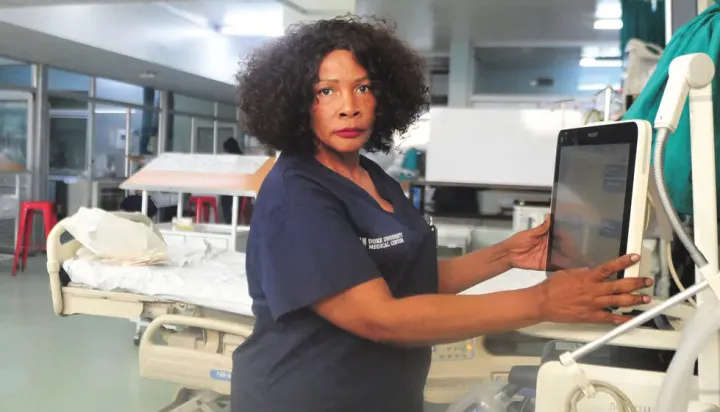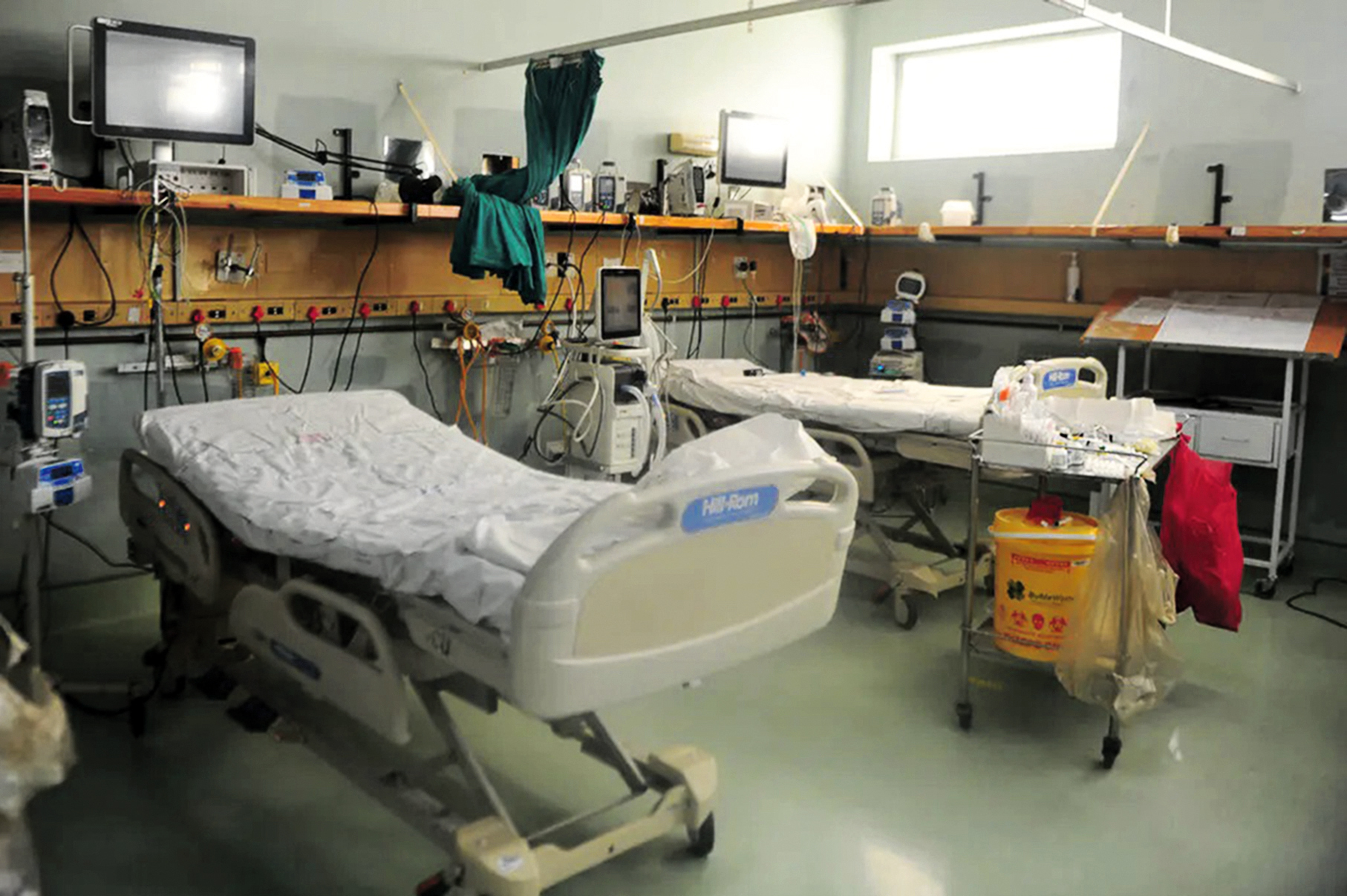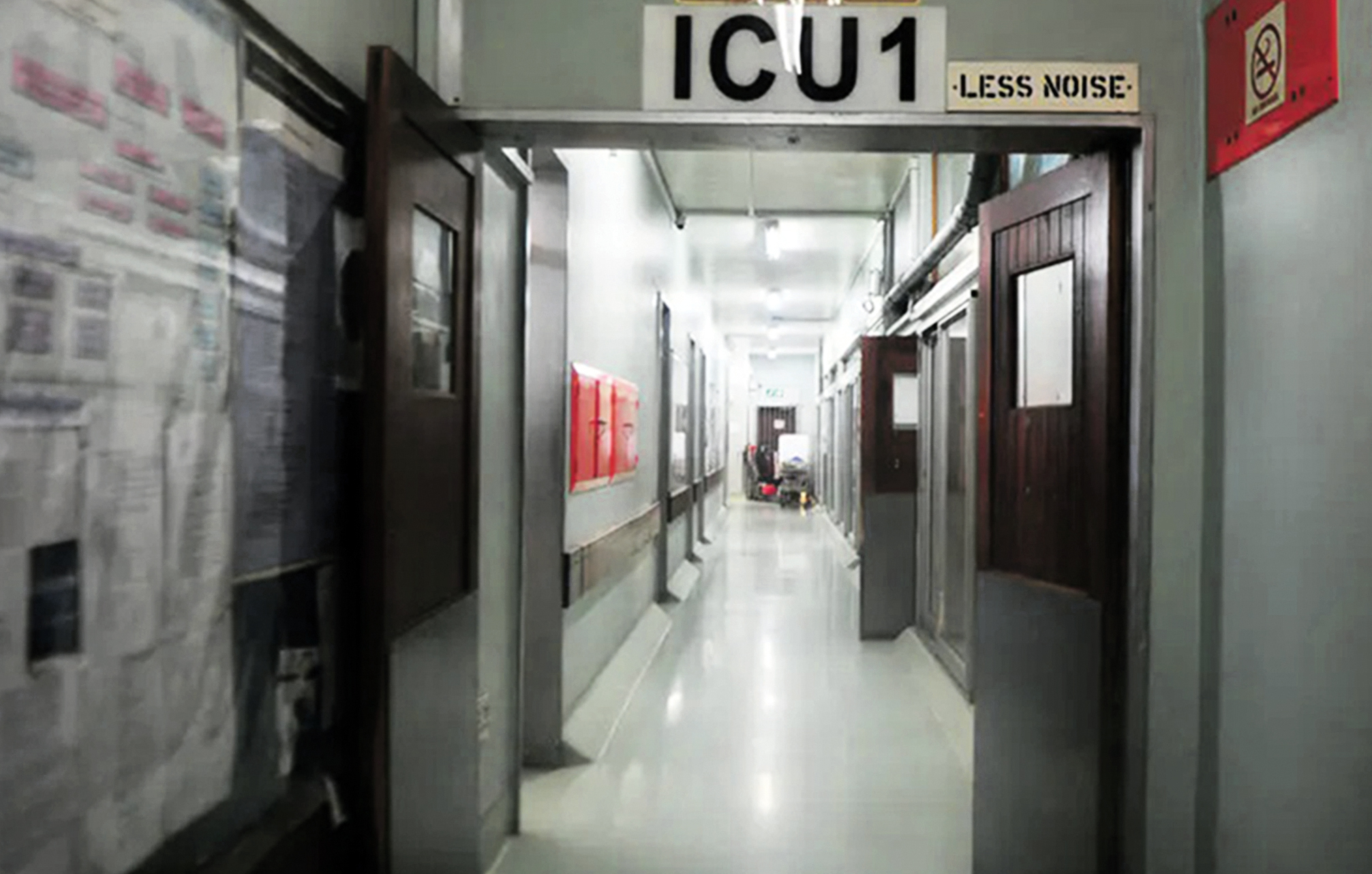SPOTLIGHT
It’s not about me, it’s about the patient – I’m primed to correct the suffering, says Bara’s head of trauma

As head of Chris Hani Baragwanath Hospital’s overburdened ICU, Professor Rudo Mathivha’s first priority is her critically ill or injured patients. But in this ailing facility, she tackles many nonmedical challenges too.
Professor Rudo Mathivha speaks slowly and thoughtfully – in direct contradiction to the hive of activity around her at Chris Hani Baragwanath Academic Hospital in Soweto, where she heads the bustling intensive care unit (ICU).
Mathivha became director of the ICU in July 1999, holding her own in a space dominated by white males. Through a pioneering critical care training fellowship, she paved the way in this subspeciality for other black women.
Two years ago, Mathivha’s work on South Africa’s Ministerial Advisory Committee on Covid-19, along with her lifetime of critical care work in resource-constrained settings, and her research into nonconventional respiratory support, antimicrobials and paediatric care, earned her a Forbes Woman Africa 2021 Award for academic excellence.
“I was the first black African female to train in critical care medicine and to head an ICU at an academic institution in South Africa,” she says. “My aim was to transform the landscape. I’m satisfied that I’ve summited that mountain. I’m on the way down to the valley below.”
Over time, I have learnt to focus on correcting the pathophysiology that’s going on, rather than making it about me.
Mathivha is speaking to Spotlight via Zoom from Baragwanath’s ICU tea room at 9am. Dressed in navy-blue scrubs bearing the words “Critical Care Consultant”, she looks fresh and alert, having arrived at the hospital at 6.30am. This is the starting time of her average working day, which usually stretches until 5pm or 6pm. Her phone, she says, is always on.
Crisis management
Mathivha recounts a devastating incident two months ago when an intruder cut pipes supplying oxygen to 26 patients in the ICU. An investigation is continuing into what appears to have been sabotage, raising questions about security at Baragwanath.

An estimated 70% of admissions at Baragwanath are emergencies, with injuries often linked to poverty and social ills, including around 160 gunshot victims a month. (Photo: Rosetta Msimango / Spotlight)
“How can a person get into a plant room and simply target the pipe that supplies oxygen to an intensive care unit?” asks Mathivha. “This person, whoever they are, knew which pipe they were cutting.”
Read more in Daily Maverick: Crisis at Chris Hani Baragwanath ICU after mystery visitor cuts oxygen
Thanks to the quick reaction from Mathivha and her staff, there was no loss of life. “When I took over as head of department, I put in a policy to always have oxygen cylinders by each station’s bedside.
“We have life-sustaining equipment that immediately senses when there’s an oxygen supply interruption. So that warning came early and we were able to switch the patients to cylinder oxygen.”
The patients had to be moved quickly to another area being used as a Covid ICU, which was fortunately empty.
“When you move critically ill patients, they become destabilised and you have to be very careful. So it took three to four healthcare workers to move one patient at a time.
“And then we had the challenge of infrastructure. We have two elevators that we use to get patients in and out of the ICU, and one of them wasn’t working – another chronic problem – so it took us close to four hours to move these patients,” she says.
‘Trained to help’
About the emotional impact of heading the ICU at Africa’s largest hospital – which serves an immediate catchment population of 1.5 million people in Soweto – Mathivha says she is trained to help suffering people, and that she does not allow suffering to distract her.
An estimated 70% of admissions at Baragwanath are emergencies, with injuries often linked to poverty and social ills, including about 160 gunshot victims a month. According to a 2022 government estimate, Baragwanath, colloquially known as Bara, has about 3,200 beds and 6,760 staff.
“I am primed to correct the suffering,” says Mathivha. “It is not pleasant to watch somebody when their body is going through changes because of stress, either an infection or trauma or burns, and it can’t function properly. But I take comfort in the sense that I have the knowledge to try to correct the abnormality that is going on.
“So, over time, I have learnt to focus on correcting the pathophysiology that’s going on, rather than making it about me. It’s not about me; it’s about the patient I’m helping,” says Mathivha.

Chris Hani Baragwanath Academic Hospital in Soweto. (Photo: Gallo Images / Fani Mahuntsi)

At Bara, as at many other public health facilities, there are staff shortages that carry a constant threat of burnout for existing staff. (Photo: Rosetta Msimango / Spotlight)
At Bara, as at many other public health facilities, there are staff shortages that carry a constant threat of burnout for staff. But Mathivha says she has learnt not to take this stress home.
“In the beginning, I used to call my late mom and dad saying, ‘Oh, it was such a hectic day. I am so tired’. And my father in particular would say, ‘What are you? A doctor, here to help your patients. So get on with it – no time to throw a pity party.’
“So, that is my approach. That doesn’t mean I’m inhuman and I do not feel. I feel, and sometimes when I lose a patient, I will counsel the family, and I will find a little corner and cry. Or sometimes I will cry with the family. And I don’t see any shame in that because I think it’s part of me expressing my humanity. Because another human has just passed on, where we couldn’t overcome what was ailing that body.”
An old hospital
Speaking wryly, she points out that maintaining infrastructure did not form part of her curriculum at medical school.
“This is an old hospital that was built during the Second World War as a convalescent military hospital for British troops,” she says. “It was then handed over to the South African government in 1948 as a civilian hospital, mainly for black patients. And it has basically remained that way since.”
Although the hospital’s walls are sturdy, the interiors are poorly maintained, often with leaking roofs.
“And when things break down,” she says, “it takes forever to be fixed. And even when fixing is done, it’s shoddy work. Cheap materials are used.
Read more in Daily Maverick: Chris Hani Baragwanath hospital’s superheroes: Saving lives on the Covid-19 frontlines
“Two weeks down the line, it breaks again and you have to get another contractor to redo the work. The roofs leak when it’s the rainy season. So this is not a comfortable environment to have patients in.
“And what is frustrating is it’s something that you talk about every time with hospital management. And our hospital management has got their hands tied because the budget to maintain the infrastructure lies with the [Gauteng] department of infrastructure development, and we have to wait for them.” DM168

This article was first published by Spotlight – health journalism in the public interest.
This story first appeared in our weekly Daily Maverick 168 newspaper, which is available countrywide for R25.





















 Become an Insider
Become an Insider
Every day hero/Goverment every day thief,difference between citizens and the thieves in power
Rather rich that the professor who claims to be driven by patient needs uses a photograph from Duke University and not from South Africa.